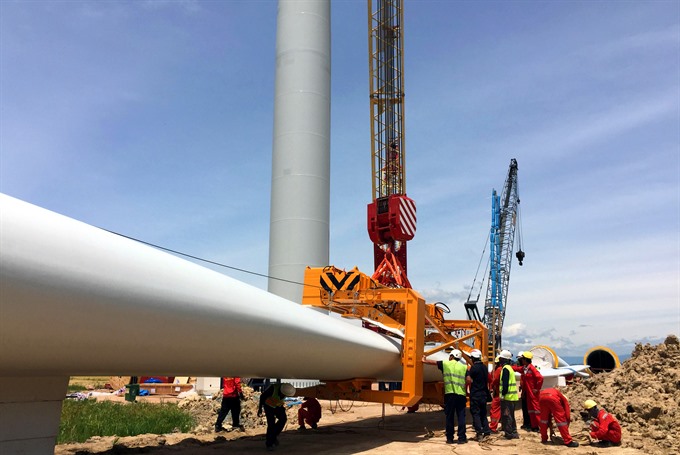 Politics & Law
Politics & Law

Prime Minister Nguyễn Xuân Phúc has reiterated the Government’s resolve to control inflation, noting that although the consumer price index (CPI) in July fell slightly from the previous month, the pressure of rising inflation remains considerable.
 |
| Technicians assemble a blade for a wind turbine that belongs to the Đầm Nại wind power project in the coastal southern central province of Ninh Thuận. The project is playing a big role in the socio-economic development of the province. — VNA/VNS Photo Công Thử |
HÀ NỘI — Prime Minister Nguyễn Xuân Phúc has reiterated the Government’s resolve to control inflation, noting that although the consumer price index (CPI) in July fell slightly from the previous month, the pressure of rising inflation remains considerable.
The PM was chairing the Government’s monthly meeting in Hà Nội yesterday to review the socio-economic situation in July and the first seven months of 2018.
He said the socio-economic situation in July was better than in June when inflation was controlled well with the CPI down 0.09 per cent after surging in the two previous months.
Though there remain a number of difficulties, Phúc asserted that the Government would try to keep this year’s inflation within 4 per cent as targeted by the National Assembly.
Core inflation (CPI excluding fresh food, energy, and State-managed services such as health care and education) has just risen by 1.36 per cent in seven months.
Stressing the need to take more measures to rein in inflation, he noted significant pressure for rising inflation as a result of higher interest rates in the world market, exchange rates and prices of essential goods, especially amid a trade war between China and the US.
Highlighting other positive economic figures, the Cabinet leader said industrial production expanded strongly by 14.3 per cent in July, including a 16.6-per cent increase in processing and manufacturing.
Other indices like retail sales of consumer goods and services, the number of international arrivals, foreign direct investment, budget revenue and exports also posted good growth. Notably, exports stood at approximately US$134 billion as of mid-July, leading to a trade surplus of $3.1 billion. Nearly 80,000 new businesses have been set up while 18,700 firms have resumed operations so far this year.
With encouraging socio-economic signs, many international organisations project a good economic outlook for Việt Nam, he said, noting that the Asian Development Bank forecast this year’s GDP growth rate at 7.1 per cent while Standard Chartered predicted this figure at 7 per cent and inflation at around 4 per cent.
However, Phúc also pointed to many shortcomings along with challenges to the economy, including the complex flooding situation. He asked the Ministry of Agriculture and Rural Development and relevant agencies to take stronger measures to manage reservoirs and dams and study the lesson of the recent hydropower dam collapse in Laos.
Expressing his worry about the slow equitisation of State-owned enterprises, he blamed many ministries, sectors and localities for not being drastic enough and requested them to accelerate this work. He noted that the Government would hold a national conference on State-owned enterprises in the future.
Regarding the national high school examination cheating in some localities, he said these scandals had greatly impacted public trust. He demanded the whole political system and relevant agencies to deal with this problem thoroughly.
In terms of scrap imports into Việt Nam – another public concern, the PM said the Cabinet’s standing members had met to discuss and issue directions on this issue with the determination of not turning Việt Nam to the world’s dumping site. He added that the public security sector had been assigned to investigate and launch criminal proceedings against importers abandoning imported scrap to avoid responsibility.
In its routine meeting, Government members will focus on policies and institutional building on July 31 and look into the socio-economic situation on August 1. — VNS




